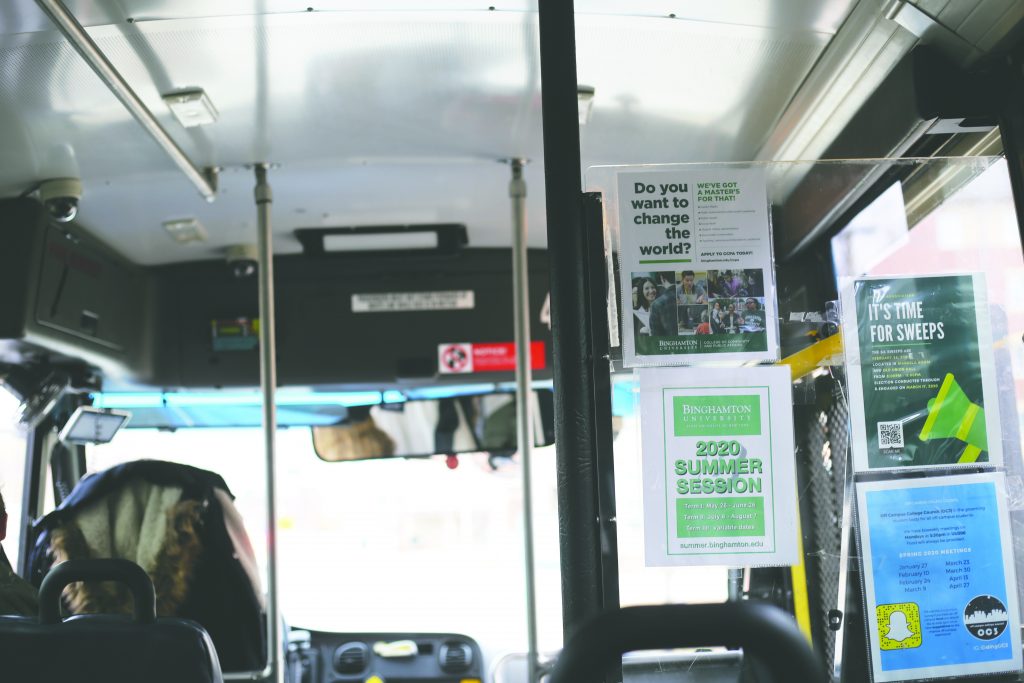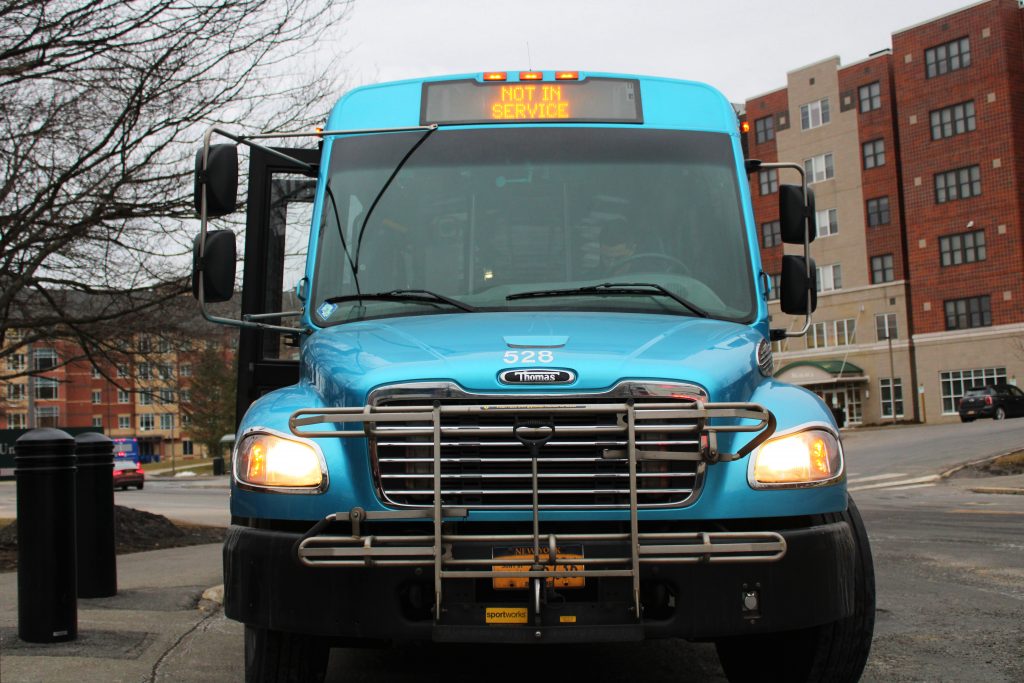
Groups unaffiliated with Binghamton University will now face difficulties advertising on Off Campus College Transport (OCCT) buses, following a change in policy from the Student Association (SA).
The change in OCCT’s advertisement policy will exclusively allow advertisements from groups affiliated with the University or the SA, while nonaffiliated groups will need to be sponsored by a student organization. Additionally, on-campus organizations that sponsor nonaffiliated advertisements must be clearly labeled as sponsors on the advertisement.
The change in policy occurred four months after an incident in which a BU student was arrested for taking down Birthright International advertisements on an OCCT bus. Birthright International aims to provide a nonjudgmental confidential zone to pregnant women seeking help, according to their website. However, some student groups at BU argued that it is a threat to people seeking helpful clinics, presenting pregnancy options with an anti-abortion view and misleading the public with their advertisements and website.
SA President Emma Ross, a senior double-majoring in political science and psychology, attributes the policy change mainly to legislation from SA Congress.
“This change is not directly related to the Birthright [International] poster,” Ross said. “This change came out of [SA] Congress legislation. Our goal here is not to bar any particular organizations from advertising on our buses.”
Ross said the amendments were made to emphasize connections between students and the advertisements displayed on OCCT buses.
“Our goal with this is to make sure that any organizations that are advertising on our buses are based on student interests,” Ross said. “That way it is not just some random organization [from Downtown Binghamton] that has an event, but if it is an event that has student interest or an organization that has student interest, that’s what our students are seeking.”
Alec Somerstein, SA vice president for finance and a senior double-majoring in business administration and mathematics, said the policy change will likely cause financial losses. He estimated OCCT could lose several thousand dollars each year.
“Just from outside vendors, anywhere from $3,000 to $5,000,” Somerstein said. “That can be recuperated if an on-campus or University-affiliated organization has access to the flyers given. So if one of those outside vendors that are already advertising wants to advertise again, they can go through a University-affiliated organization. The thing is if they end up doing that, there are some money losses because the on-campus affiliates have less and are charged less for advertising on blue buses.”
Prior to the incident with Birthright International advertisements, multiple on-campus organizations had been advocating for a change in policy, including the Women’s Student Union (WSU), an SA-chartered group that aims to support the rights of marginalized identities and discuss women’s issues. Alexandra Miranda, vice president of WSU and a sophomore triple-majoring in sociology, human development and Latin American and Caribbean Area studies, wrote in an email that the organization voiced its discontent while trying to work with the SA on the policy change.
“The process of working with OCCT and the SA to bring about these policy changes was incredibly difficult and frustrating,” Miranda wrote. “We were consistently ignored and our concerns were not taken seriously. Our members and students outside of our organization reached out to us multiple times expressing their concern about these advertisements, yet OCCT and SA chose to neglect making a change for over a year.”
Despite the changes that have recently been made, Miranda said she and other members of WSU are still dissatisfied with the changes instituted by OCCT.
“WSU is happy to see the posters taken down,” Miranda wrote. “However, this policy does not advocate for establishing a screening process or review of future advertisements, so that something like this does not happen again.”
Dheiva Moorthy, vice president of College Progressives and a sophomore double-majoring in environmental studies and sociology, said she also has concerns about the new policy. Moorthy was the student arrested in October for allegedly tearing down the Birthright International advertisements. She said there are too many loopholes around the advertisement policy and argued that it should use more specific language to bar problematic organizations.
“The politicization of the act was not that it was just a pro-life poster — it was literally a wrong poster,” Moorthy said. “[Birthright International] doesn’t provide confidential services. They don’t make the best possible decision for you. They don’t address women of color, especially poor women of color. What the SA should have said is, ‘We are not going to put up harmful, incorrect information and advertisements anywhere on campus.’”
Moorthy also emphasized that several campus groups came together to voice support for the policy change.
“[WSU], College Progressives, the Frances Beal Society [and] DIVEST BING all share the same goals, which is liberation,” Moorthy said. “[College Progressives] did advocate for this change, along with WSU … Although club names are irrelevant, anyone that wants to work on a project needs to work on a project.”
Ross said the finalization of the new policy is in the works and the SA is organizing the legal framing of the change.
“We’re currently working on official language with our attorney to make sure that all new language is up to code with regard to these new policies and hopefully that should be up and running within the next week or so,” she said.



